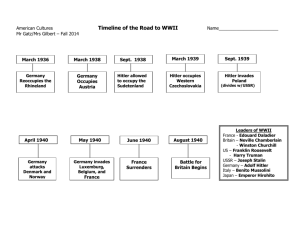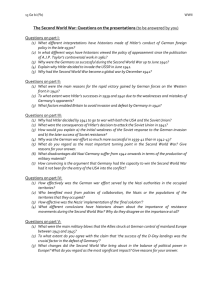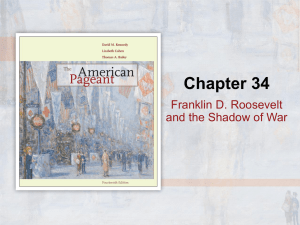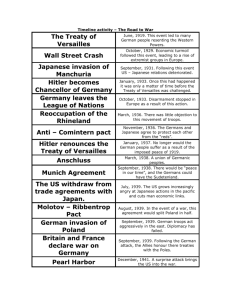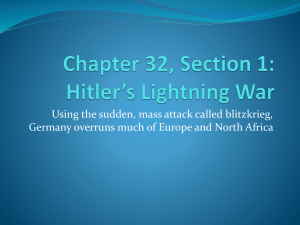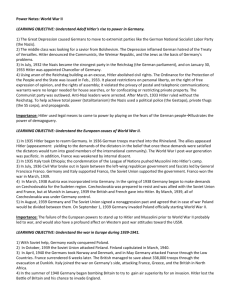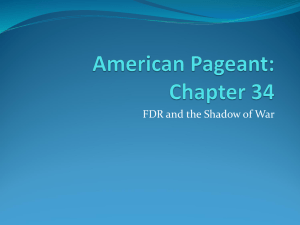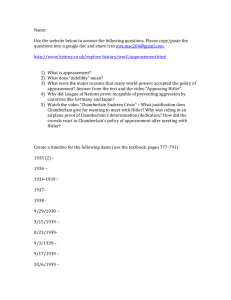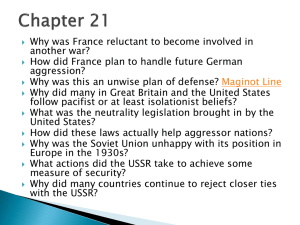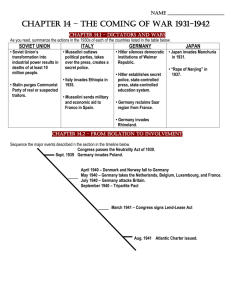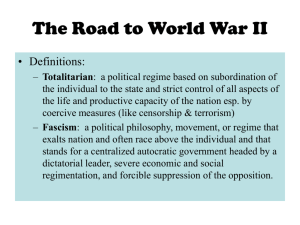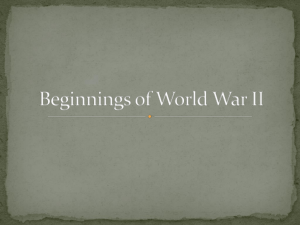WWII Causes-Powerpoint
advertisement
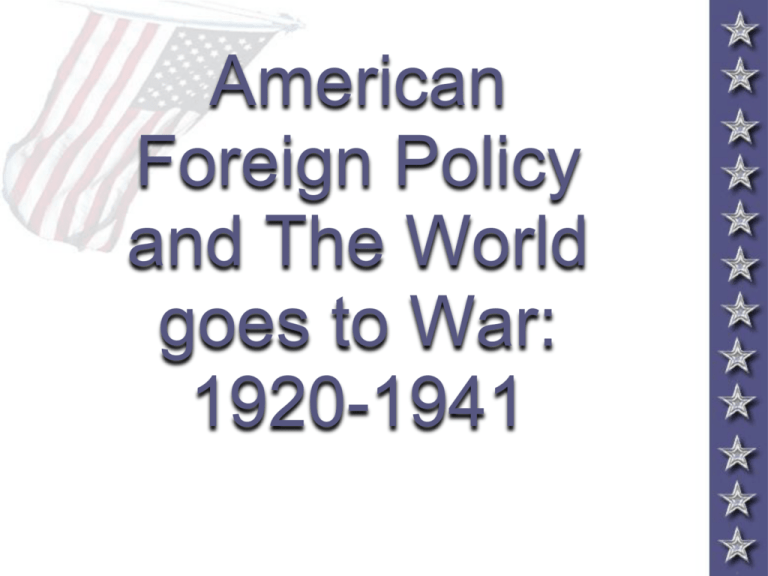
American Foreign Policy and The World goes to War: 1920-1941 Foreign Policy TensionsPOST WWI Interventionism Disarmament • Collective security • Isolationism • “Wilsonianism” • Anti-War movement • Democrats • Republicans Causes of WWII #1-Treaty of Versailles - Germany lost land to surrounding nations -War Reparations -Allies collect $ to pay back war debt to the US. -Germany must pay $32 billion($442 billion today). -Bankrupted the German economy & embarrassed the German people. 3 Lloyd George, Georges Clemenceau, and Woodrow Wilson during negotiations for the Treaty #2-Economic hardships caused by WWI lead to the rise of dictators. Hyper-Inflation in Germany: 1923 #3-The Ineffectiveness of the League of Nations World-wide Depression-Begins 1929 -Desperate people search for hope and answers…. •Hitler seemed to provide solutions to Germany’s problems •Hitler sought lebensraum-living space & the return of German speaking lands. 23 - Wallpapering with German Deutchmarks Rise of Totalitarian Regimes In a Totalitarian country, individual rights are nonexistent and the dictator requires complete subservience to the state. Communist Dictatorship (USSR) Communism- political theory of Karl Marx: government or State owns all means of production ---- citizens are paid according to abilities and needs. -citizens are required to obey the dictator. Totalitarianism Military Dictatorship (Japan) Fascist Dictatorships (Germany, Italy & Spain) Fascism: government based on racism & nationalism with a demand for obedience to the leader Major Leaders Adolf Hitler Nazi Germany 1933 Benito Mussolini Italy 1921 10 Major Leaders Hideki Tojo Japanese Prime Minister -Military Commander 1930 Joseph Stalin Russian Leader-1924 International Agreements-pre Hitler Locarno Pact – 1925 France, Germany, Great Britain & Italy Guarantee existing frontiers Obey the DMZ 30 miles deep on the banks of Rhine River-the Rhineland Refrain from aggression against each other Kellogg-Briand Pact-the World Peace Act 1928 Made war illegal as a tool of diplomacy 61 Nations signed-inc. US, Germany & Japan No enforcement provisions Japanese Attack Manchuria (1931) League of Nations condemned the action. Japan leaves the League. Hoover wanted no part in an American military action in the Far East. Japan Invades Manchuria, 1931 Isolationism of THE US Why was the U.S. Isolationist? -Great Depression -Perceptions of WWI - WWI did not seem to solve much - People began to believe that the US joined WWI for the wrong reasons (greedy American businessmen!) Isolationism - led to European policies of “Appeasement” * to pacify by giving in to demands (give dictators what they want and hope they are satisfied) It began with the Japanese invasion of Manchuria, Italian invasion of Ethiopia, and continued with Hitler . . . Hoover-Stimson Doctrine (1932) US would not recognize any territorial acquisitions that were achieved by force. US supplies to China and Japan continue…. Japan bombed Shanghai in 1932 massive casualties. Nye Committee Hearings (1934-1936) The Nye Committee investigated -WW I was needless & the US entered so munitions owners could make big profits [“merchants of death.”] Senator Gerald P. Nye [R-ND] - bankers wanted war to protect their loans & arms manufacturers to make money. Resulted in Congress passing several Neutrality Acts. Neutrality Acts: 1935, 1936, 1937 When the President proclaimed the existence of a foreign war, certain restrictions would automatically go into effect: Prohibited sales of arms to belligerent nations. Prohibited loans and credits to belligerent nations. Forbade Americans to travel on vessels of nations at war [in contrast to WW I]. Banned involvement in the Spanish Civil War. This limited the options of the President in a crisis. America in the 1930s declined to build up its forces! Italy Attacks Ethiopia, 1935 Emperor Haile Selassie Germany Invades the Rhineland March 7, 1936 World-wide Depression continues… - Hitler became chancellor of Germany in1933. -he provided scapegoats for Germany’s problems (Jews, foreigners, communists, Romanian (Gypsies), mentally ill, capitalists homosexuals, mixed race, dark skinned etc..) -NON ARIAN Nuremburg Laws 1935 reclassified Jews –non citizens & removed their basic civil rights. Defined the Jewish race –three or four Jewish grandparents. --one or two Jewish grandparents you were considered to be mixed race. -- eventually anyone with at least one Jewish grandparent was at risk in Nazi Germany -Jews could only marry Jews Kristallnacht PM November 9 and 10, 1938, gangs of Nazi youth roamed through Jewish neighborhoods breaking windows of Jewish businesses and homes, burning synagogues and looting. * 101 synagogues were destroyed * 7,500 Jewish businesses were destroyed * 26,000 Jews were arrested and sent to concentration camps. Jews were physically attacked and beaten and 91 died in the attack. Kristallnacht Kristallnacht Kristallnacht The Spanish Civil War: 1936 - 1939 Francisco Franco Panay Incident (1937) December 12, 1937. Japan bombed USS Panay gunboat killing two Americans & destroying 3 Standard Oil tankers on the Yangtze River. Japan apologized, paid US $2 million and promised no further attacks. Most Americans were satisfied with the apology. Results Japanese interpreted US tone as a license for further aggression against US interests. The Sino-Japanese War 1937 • Japan invades China & tightens control over Korea. • Goal-Eliminate Korea & Chinese culture : control all citizens & resources. • Culture Destroyed – Forced worship Japanese, Shinto, shrines – Banned -Korean language, newspapers, Korean history. Thousands of cultural artifacts destroyed. – Men forced in Japanese Army WWII/Women & girls forced to be sex slaves. The Japanese Invasion of China, 1937 The Rape of Nanking The Austrian Anschluss, 1938 Ludlow Amendment (1938) A proposed amendment to the Constitution that called for a national referendum on any declaration of war by Congress. Introduced several times Never passed……. Congressman Louis Ludlow [D-IN] Good idea? What Was Hitler Asking For? Return of German Speaking Lands-Living Space “Lebensraum” Sudetenland – (part of Czechoslovakia) German Troops Parade in Streets of Czechoslovakian Town, ca. 1938 Sudetenland Appeasement: The Munich Agreement, 1938 The Sudetenland, part of Czechoslovakia is given to Hitler British P M Neville Chamberlain French P M Edouard Daladier • “ My good friends, this is the second time in our history that there has come back from Germany to Downing Street peace with honour. I believe it is peace for our time [emphasis added]. We thank you from the bottom of our hearts. And now I recommend you to go home and sleep quietly in your beds.” Czechoslovakia Becomes Part of the Third Reich: 1939 The Nazi-Soviet Non-Aggression Pact, 1939 Foreign Ministers von Ribbentrop & Molotov Poland Attacked: Sept. 1, 1939 Blitzkrieg [“Lightening War”] German Troops March into Warsaw September 3, 1939 • France and Great Britain declare war on Germany Hitler's triumphal entry into Danzig, Poland 1939 1939 Neutrality Act In response to Germany’s invasion of Poland. FDR persuades Congress in special session to allow the US to aid European democracies in a limited way: The US could sell weapons to the European democracies on a “cash and carry” basis. FDR was authorized to proclaim danger zones which US ships and citizens could not enter. Results of the 1939 Neutrality Act: Aggressors could not send ships to buy US munitions. The US economy improved as European demands for war goods increased. America became the “Arsenal of Democracy.” Rome-Berlin-Tokyo Axis, 1940 Allies (major powers) The Big Three Axis (major powers) Great Britain Germany USSR Italy United States Japan France (note: France surrendered to Germany in 1940 (after 6 weeks of fighting) The “Phoney War” Ends: April 9, 1940 Blitzkrieg “Lightning War” 1940 Hitler invades: – Belgium – Northern France (Italy invades from the South) – Denmark – Norway – The Netherlands – Luxembourg – Britain-Air Raids Dunkirk Evacuated June 4, 1940 France Surrenders June 25, 1940 France Surrenders June 25, 1940 A Divided France Henri Petain The French Resistance The Free French General Charles DeGaulle Now Britain Is All Alone! British Prime Minister Winston Churchill May 1940 Battle of Britain: The “Blitz” July-Oct. 1940 Battle of Britain: The “Blitz” The Royal Air Force-RAF German Targets: airfields, Aircraft, oil supplies, cities. The London “Tube”: Air Raid Shelters during the Blitz U. S. Lend-Lease Act 1941 US would lend or lease (RENT) arms to any country whose defense was vital to the US staying out of war (first applied to Britain). Early Loans Great Britain.........................$31 billion Soviet Union…………………………………….… $11 billion France..................................$3 billion China..................................$1.5 billion Other European......................$500 million South America.......................$400 million The amount totaled: $48,601,365,000 by 1945 Lend-Lease Operation Barbarossa: Hitler’s Biggest Mistake Operation Barbarossa: June 22, 1941 - 3,000,000 German soldiers. - 3,400 tanks. The Atlantic Charter - Post War Planning. Roosevelt and Churchill signed a treaty of friendship in August 1941. - Solidifies alliance. - Calls for League of Nations type organization. Europe 1941 & FDR Elected for a 3rd term Pearl Harbor Admiral Isoroku Yamamoto Pearl Harbor from the Cockpit of a Japanese Pilot Pearl Harbor - Dec. 7, 1941 A date which will live in infamy! USS Arizona, Pearl Harbor President Roosevelt Signs the US Declaration of War Japan-Dec. 8, 1941 Germany & Italy Dec. 11, 1941 President Roosevelt Signs the US Declaration of War Japan-Dec. 8, 1941 Germany & Italy Declared war on The United StatesDec. 11, 1941 Pearl Harbor Memorial 2,887 Americans Dead! DOUBLE V CAMPAIGN • • • * VICTORY OVER Fascism ABROAD * VICTORY OVER Racism IN AMERICA
